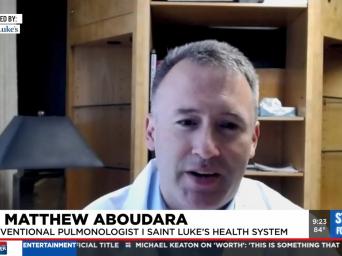Interventional Pulmonology
Interventional pulmonology is a specialty that uses advanced, minimally invasive diagnostic tests and procedures for lung, airway, and chest conditions. Saint Luke’s has a team of fellowship-trained interventional pulmonologists.
For referring providers, use this helpful resource to get started.
Conditions we treat
Our interventional pulmonology team cares for patients with a variety of pulmonary symptoms and conditions including:
- Throat, lung, and chest cancers
- Lung nodules and masses
- Enlarged lymph nodes
- Fluid buildup around the lungs
- Narrowing of the trachea
- Central airway obstruction
- Emphysema
- COPD
- Severe asthma
- Foreign body aspiration
Benefits
An interventional pulmonologist uses minimally invasive tools and procedures, which allows patients to avoid riskier procedures such as chest wall surgery.
For example, an interventional pulmonologist can diagnose and stage a tumor in the same procedure. This eliminates the need for a more invasive biopsy and gives patients more information about their cancer diagnosis immediately after a procedure.
An interventional pulmonologist also is trained to safely remove tumors or blockages in the airways common with lung cancer, improving a person’s chance of survival and quality of life.
Procedures
Therapeutic
- Rigid bronchoscopy
- Fully covered and uncovered self-expandable stents
- Silicone stents
- Stent removal
- Electrocautery and argon plasma coagulation
- Photodynamic therapy
- Cryotherapy (standard and spray delivery)
- Foreign body removal
- Microdebrider
- Balloon bronchoplasty
- Bronchial thermoplasty
- Endobronchial valves for emphysema and bronchopleural fistulas
Advanced diagnostic
- Navigational bronchoscopy
- Radial endobronchial ultrasound
- Transbronchial cryobiopsy
Pleural procedures
- Medical thoracoscopy
- Indwelling pleural catheters (Pleurex)
- Thoracentesis
- Chest tubes
Providers

Matthew C Aboudara, MD


